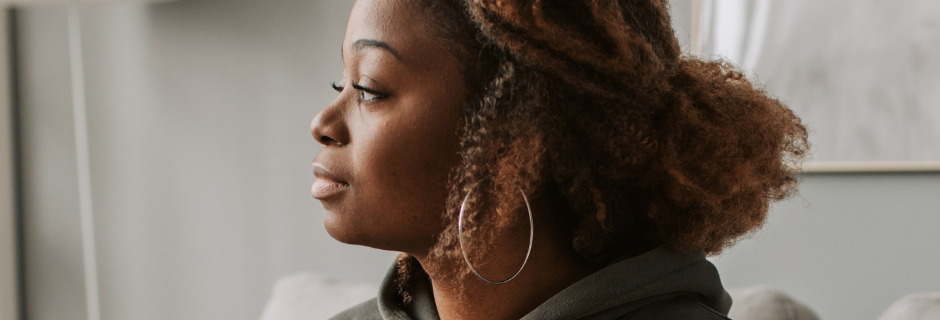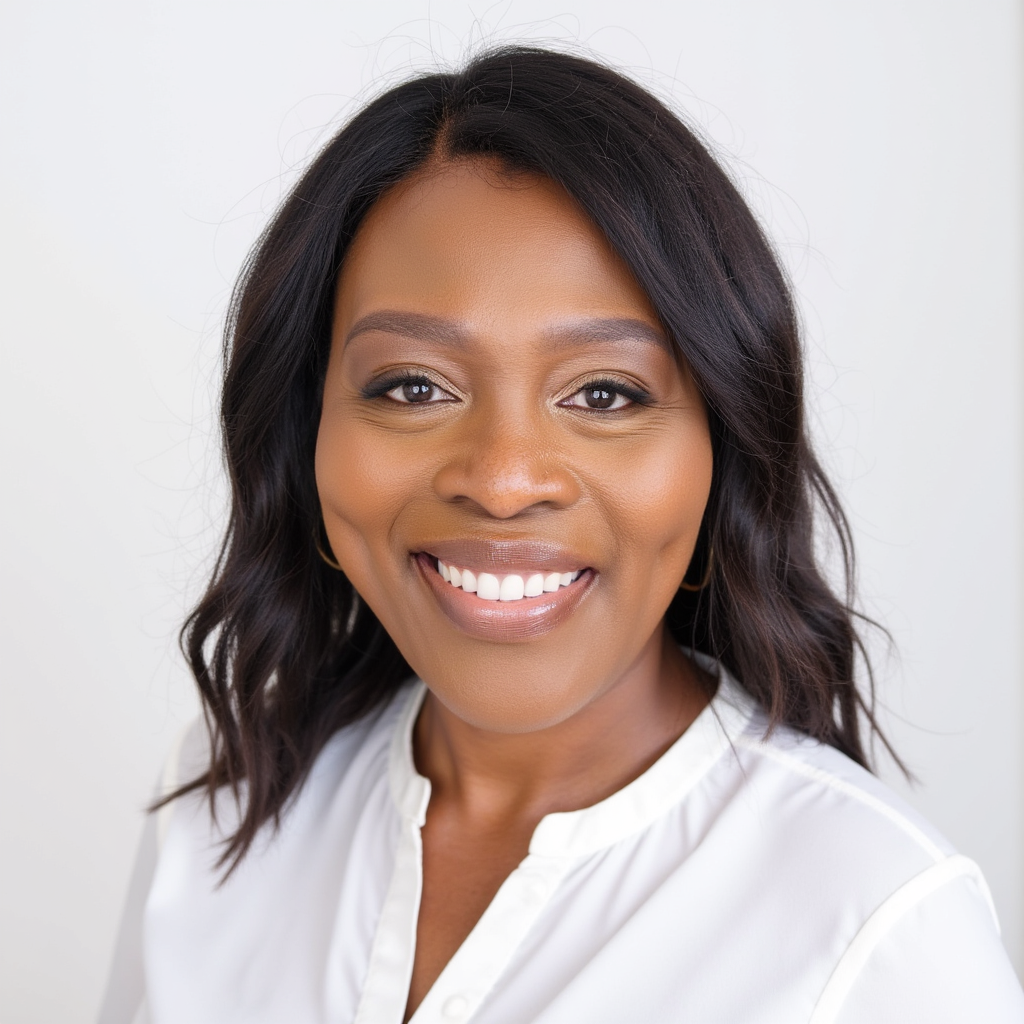What is Christian counseling and what to consider before working with one
When the silence starts to speak
What is christian counseling? It begins where faith meets fatigue. You've been taught that your value is measured by how much you can carry. How much you can endure without breaking. How you can be everyone's soft place to land while never asking for one of your own. This isn't just about being a strong woman. This is about being a Black woman in a world that has always demanded your strength while denying you tenderness.
You come home, drop your keys on the counter, and sthe house is quiet but your mind is not. You've smiled through another day of code-switching, managing other people's comfort, proving your competence twice as hard. You've prayed for strength, again, because that's what you were taught to do. But somewhere in the silence, you're wondering: What if the problem isn't my faith? What if the problem is that I've been conditioned to call exhaustion faithfulness? You tell yourself to be strong. To be grateful. To pray. And you do. You keep showing up, at work, at church, for your family, but somewhere along the way, the version of you that used to feel connected, hopeful, and alive feels distant.
Maybe you have whispered to yourself, something has to change. Not because you have lost your faith, but because you are losing your breath trying to live up to it.
That is where I meet most women who find their way here.
In case we have not met yet, I am J. , a psychologist and founder of Deeply Seen Psychological Services in Los Angeles. I started this practice after my own season of quiet unraveling, when prayer alone was not enough to hold the weight I was carrying. I realized how many women of faith, especially women of color, are taught to keep giving, keep leading, and keep believing even when we are breaking.
Deeply Seen was born from that realization, that healing and faith were never meant to live apart. That we need sacred spaces where we can tell the truth about our exhaustion and still be seen as faithful. Where therapy feels like a homecoming, not a contradiction.
That is what christian counseling offers, a place where you do not have to choose between your faith and your feelings.

What christian counseling really is
Christian counseling is not about fixing what is broken in your faith. It is about allowing your faith to breathe inside your healing. It begins with the belief that emotional and spiritual restoration were never meant to be separate journeys.
At its heart, christian counseling is where faith and psychology meet in service of your wholeness. It is a space that honors both what you know about God and what you are learning about yourself. It invites your mind, body, and spirit to finally move in the same rhythm.
In therapy, your counselor does not ask you to choose between prayer and professional care. They weave both together. You might talk through the anxiety that has been sitting in your chest for months, and then pause to pray or reflect on what grace could look like in that moment. You might explore patterns of burnout or self-criticism and learn to replace them with compassion rooted in Scripture.
This process is not about fitting your life into a formula. It is about discovering what helps you heal. Sometimes that means talking through the science of how your brain responds to stress. Other times, it means looking at the quiet places where God is already working and learning to see His presence there.
Christian counseling sees you as a whole person. It considers your relationships, your emotions, your body, and your spiritual life as deeply connected. When one part of you hurts, the others feel it too. That is why healing needs to reach all of you.
A christian counselor helps you explore anxiety, grief, burnout, or identity struggles using both evidence-based practices and spiritual insight. They do not dismiss your feelings as weakness or your faith as denial. They walk with you as you reconnect to the truth that healing your mind does not take you away from God. It brings you closer to Him.
They will not ask you to pray it away. They will help you see where God might be inviting you to heal in deeper and more honest ways. Sometimes the most powerful act of faith is not pretending you are fine, but allowing grace to meet you in the places you have kept hidden.

Why many high-achieving Black Christian women of faith seek this kind of therapy
You probably never planned to be here. You have always been the one who fixes, leads, prays, and keeps things running. But lately, you have felt the weight of it in your body, in your sleep, in the silence that follows your prayers.
Many women of faith come to therapy when their strength starts to ache. When the verses they have lived by still hold truth, but no longer seem to hold them. When the life they built from obedience and effort begins to feel too tight for the person they are becoming.
Let's name what we're really talking about. The Strong Black Woman isn't just a personality trait, it's a survival response to centuries of being denied protection, rest, and vulnerability. Society positioned you as the mule of the world, as Zora Neale Hurston wrote. You learned early that your pain didn't matter as much as your productivity. That complaining made you "difficult." That needing help made you weak.
You internalized a narrative that says your worth is tied to how much you can carry alone. And the church, for all its beauty, often reinforced this, praising your service, your sacrifice, your ability to "hold it together" even when you were falling apart. No one taught you that rest is resistance. That boundaries are biblical. That God never intended for you to be everyone's savior.
You might seek christian counseling because you are tired of pretending that trusting God means pretending everything is fine. You come because the peace you read about feels far away, and you want to know how to find it again.
Some women arrive after a loss that no one helped them grieve, because they were told to stay strong. Others come after years of burnout, giving everything to ministry or family, and realizing that the cost has been themselves. Some come because they feel guilty for even needing help, unsure if therapy fits inside their faith.
Christian counseling becomes the place where all of that can be said out loud. The guilt, the pressure, the questions you were afraid to ask. It is where the woman who has carried everyone else finally gets to exhale.
You seek this kind of therapy because you want your faith to feel alive again, not like a script you are reciting. You want to feel joy without forcing it, to pray without anxiety sitting in your chest. You want to stop managing your pain and start healing from it.
Women come to christian counseling not because they have stopped believing, but because they want to believe more fully, with their whole selves. They come because they are ready to trade perfection for peace.
You can know this space is for you if
- You are tired of being strong all the time but do not know how to stop
- You love God but feel distant from yourself
- You have been caring for everyone else and now want to care for your own heart
- You long for peace that lasts longer than a moment of prayer
- You want to heal without abandoning your faith
- You are ready to be seen, not just supported
What happens inside christian counseling
Picture this. You walk into the room still holding your breath from the day. You have answered every email, carried every burden, smiled through every meeting, and prayed for strength in between. The air feels different here though. It is quiet, but not empty. Safe, but not silent.
You sit down, and for the first time in a long time, no one is asking you to lead or to give. Your counselor does not rush you. She waits, and something in that waiting gives you permission to let go of the act. The words start slowly. Sometimes they stumble. Sometimes they break. And then, finally, they come.
And then she asks you something no one else has: "Who taught you that your needs don't matter? When did you learn to disappear?"
You might freeze. You might cry. Because someone is finally naming the thing you've been carrying in silence, the belief that taking up space is selfish, that asking for help is weak, that your pain isn't as important as keeping everyone else comfortable.
Your counselor doesn't let you deflect with scripture or gratitude. She holds space for your anger, your grief, your rage at a world that took and took and called it strength. This is where the real work begins, not in positive thinking or prayer alone, but in excavating the lies that live in your bones.
You talk about the things you never say out loud. The marriage that looks fine on Sunday but feels hollow by Monday. The panic that wakes you before dawn. The fear that your faith is slipping through your fingers even though you are trying to hold on.
Every session looks different, but the rhythm is the same. Gentleness. Truth. Presence. You are guided, not judged. You are invited to tell the truth about what hurts without worrying if it sounds holy enough.
Sometimes prayer rises naturally, like breathing. Sometimes silence holds more power than any verse could. Both are sacred. Both count as faith.
Little by little, you begin to notice the shift. The way your shoulders soften when you talk about what used to make you tense. The way your breath slows when you remember that you are safe. You realize that christian counseling is not about fixing you. It is about making space for you to feel again, to see God not only in your victories but also in your valleys.
Think of it as learning how to breathe again, not to rush toward the next solution or scripture, but to sit in stillness and finally let grace catch up to you. Therapy does not compete with your faith. It creates the quiet where you can finally feel it again.

The difference between christian counseling and traditional therapy
Imagine walking into two different rooms.
In the first, you sit across from a therapist who listens carefully, takes notes, and helps you understand your thoughts and patterns. You talk about childhood, stress, relationships, and self-care. You leave with insight, maybe even a plan. But something about it still feels incomplete, like healing only half of what hurts. You have spoken about your pain, but not about your faith, and that silence feels like leaving a part of yourself outside the door.
Now imagine another room. The light is softer. You exhale before you even speak. Your counselor still listens with the same professional skill, but she also understands the part of you that prays before every big decision. She does not flinch when you say you feel far from God. She does not tell you to separate your emotions from your faith. Instead, she helps you see how they can live together without conflict.
That is what christian counseling offers. Traditional therapy helps you make sense of your story. Christian counseling helps you see where God is woven through it. It recognizes that your mind and your spirit speak the same language, and both deserve care.
In christian counseling, psychology and prayer are not opposites. One helps you understand the roots of your pain, the other reminds you that redemption is possible. Together they help you heal both the science of your brain and the silence of your soul.
If you are a woman of faith, this difference matters. Because you do not need to fragment yourself to heal. You do not need to check your beliefs at the door to be taken seriously. In christian counseling, you are free to bring your whole self, your tears and your theology, your logic and your longing.
Choosing christian counseling doesn't mean you're weak. It means you're done fragmenting yourself to make others comfortable. It means you refuse to choose between being spiritually whole and psychologically free. For too long, Black women have been told to "pray about it" when they needed therapy, or told that bringing God into the counseling room wasn't "real" psychology. Christian counseling rejects that false choice. Both matter. You don't have to amputate parts of yourself to heal. You get to bring your whole story, the trauma and the testimony, the doubt and the devotion.
Types of christian counseling
Christian counseling is not one single path. It adapts to your story, to where you are, and to what your heart needs most. Every form offers something different, but all share the same intention: to bring your faith and your healing into the same space.
Individual counseling
A space just for you. It is quiet enough to hear your own thoughts again. Here you can talk about anxiety that will not let you rest, sadness that lingers, or grief you never had time to process. You learn to be gentle with yourself, to understand your patterns, and to rebuild your peace with honesty and grace.
Family counseling
A space for everyone to sit together and begin again. It helps you untangle years of miscommunication or silence, and teaches your family how to listen without judgment. You learn to speak with compassion, to reconnect, and to bring faith back into daily life as the center that steadies your home.
Marriage counseling
A space to rediscover connection, trust, and love. It helps you see your partner through softer eyes, to forgive, to rebuild intimacy, and to grow together in both faith and emotional honesty. It is not about who is right. It is about remembering what brought you together and what still matters most.
Group counseling
A space where healing becomes shared. You sit among others who understand what it means to love God and still feel lost at times. Hearing their stories helps you make peace with your own. The room becomes a mirror of grace, a reminder that you are not the only one learning how to heal.
Each path offers a different way back to yourself. Whether you come alone, with your partner, or with your family, christian counseling meets you where you are and guides you toward the wholeness you have been praying for.
What to consider before working with a christian counselor
Choosing a counselor is not only a practical decision, it is an act of trust. It means allowing someone to hold your story, your faith, and your pain with care. Before you begin, take time to be intentional about who walks beside you.
Credentials and training
- Look for a counselor who is licensed and professionally trained, such as an LPC, LMFT, psychologist, or clinical social worker.
- A christian counselor should be able to blend psychological knowledge with faith-based insight, helping you explore your emotions and your beliefs with both compassion and skill.
- Ask about their experience in integrating faith and psychology. The best counselors know how to hold both Scripture and science with respect, so you never feel that one cancels the other.
Faith alignment and personal connection
Therapy is most powerful when you feel seen:
- Take time to ask how the counselor incorporates spirituality into sessions.
- Do they pray with clients if requested?
- Do they use biblical principles in their work?
- Do they respect the pace and depth of your faith journey?
Choose someone whose presence feels safe and whose values feel familiar. Trust your spirit on this. The right counselor will feel like a calm breath, not a performance.
Your goals and expectations
Before you begin, be clear with yourself about what you want to find in this space.
- Do you want to heal from something that still feels unfinished?
- Are you hoping to strengthen your marriage or your family?
- Are you seeking spiritual direction, emotional peace, or clarity about your next chapter?
A christian counselor will walk with you toward those goals, helping you connect your emotional growth with your spiritual life.
It is also important to remember that christian counseling complements, but does not replace, medical or psychiatric care when it is needed. Healing can involve many forms of support, and faith can hold them all. The best counselor for you is the one who helps you feel known, held, and reminded that your story is sacred work.

Benefits of christian counseling
When you begin to let faith and therapy meet, something sacred shifts inside you. The weight does not disappear overnight, but it starts to feel lighter. The peace you have prayed for stops feeling distant. The words you read in Scripture begin to touch the places that used to ache in silence.
Christian counseling offers more than relief. It offers restoration of your voice, your clarity, your connection to God, and your ability to feel safe within yourself again.
- Integration of spiritual and emotional healing
- Tools for resilience, hope, and purpose
- Strengthened marriages, families, and personal well-being.
- An approach that honors both faith and science
- Deeper connection with God
- Healing from spiritual guilt
- Rediscovery of identity and purpose
- Freedom from perfectionism
- Greater emotional literacy
- Long-term transformation
Christian counseling does not erase the storms of life. It teaches you how to stand in them with steady faith, grounded peace, and the knowing that you are never alone in your healing.
For the woman who is ready to come home to herself
It is late. The house is quiet. You sit in the same chair you always do after everyone has gone to sleep. The light is dim, the air still. For the first time in a long time, you are not scrolling or planning or praying for the next thing to hold together. You are just sitting there, letting yourself feel the ache under your strength.
You whisper something small. Maybe it is a prayer. Maybe it is a confession. Maybe it is the simple truth that you are tired. And in that stillness, something holy begins to unfold. You realize that God never asked you to carry it all, only to trust that He could meet you in what you can no longer hold.
You start to imagine what it would be like to be cared for the way you have cared for everyone else. To walk into a room where you do not need to be the strong one, where someone gently reminds you that rest is not rebellion, it is reverence.
Christian counseling is that room. It is where your tears are not weakness, your silence is not failure, and your faith does not have to perform to be real. It is where you begin to breathe again, to speak again, to believe again.
If something in these words feels like a mirror, if your chest softens as you read them, if your soul has been whispering I cannot keep doing this alone, then this is your invitation.
If your chest tightened reading this, if something in you whispered "yes, but I can't," if your first thought was "other people need it more than I do". Stop. That's the conditioning talking. That's the lie that keeps you small.
Here's the truth: Choosing yourself isn't selfish. It's sacred. Getting help isn't a failure of faith, it's an act of resistance against every system that taught you to suffer in silence.
You've been the strong friend long enough. You've held space for everyone else's healing while your own soul went hungry. The women who came before you survived so you could do more than survive. They endured so you could choose to thrive.
This is your invitation, not to fix yourself, but to finally be seen. To let someone else hold the weight while you remember who you are beneath the armor.
Explore christian counseling at Deeply Seen Psychological Services and choose the healing that refuses to let you play small.
You don't need permission. But if you're waiting for it, here it is: You are allowed to rest. You are allowed to need.
You are allowed to be held.
Now step into the door.

Hi! I'm Dr. J (Jackie Johnson)
Faith-rooted therapist & executive coach for high-achieving women of color
I help high-performing Black women and women of color release burnout, reconnect with their worth, and reclaim their voice—through soulful, faith-affirming therapy and trauma-informed coaching rooted in emotional safety and spiritual alignment.
Download my free guide




